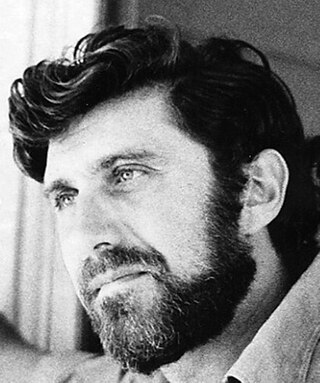Related Research Articles
Social psychology is the scientific study of how thoughts, feelings, and behaviors are influenced by the actual, imagined, or implied presence of others. Social psychologists typically explain human behavior as a result of the relationship between mental states and social situations, studying the social conditions under which thoughts, feelings, and behaviors occur, and how these variables influence social interactions.

Leon Festinger was an American social psychologist who originated the theory of cognitive dissonance and social comparison theory. The rejection of the previously dominant behaviorist view of social psychology by demonstrating the inadequacy of stimulus-response conditioning accounts of human behavior is largely attributed to his theories and research. Festinger is also credited with advancing the use of laboratory experimentation in social psychology, although he simultaneously stressed the importance of studying real-life situations, a principle he practiced when personally infiltrating a doomsday cult. He is also known in social network theory for the proximity effect.
In the field of psychology, cognitive dissonance is described as the mental disturbance people feel when they realize their cognitions and actions are inconsistent or contradictory. This may ultimately result in some change in their cognitions or actions to cause greater alignment between them so as to reduce this dissonance. Relevant items of information include peoples' actions, feelings, ideas, beliefs, values, and things in the environment. Cognitive dissonance is typically experienced as psychological stress when persons participate in an action that goes against one or more of those things. According to this theory, when an action or idea is psychologically inconsistent with the other, people do all in their power to change either so that they become consistent. The discomfort is triggered by the person's belief clashing with new information perceived, wherein the individual tries to find a way to resolve the contradiction to reduce their discomfort.
Self-perception theory (SPT) is an account of attitude formation developed by psychologist Daryl Bem. It asserts that people develop their attitudes by observing their own behavior and concluding what attitudes must have caused it. The theory is counterintuitive in nature, as the conventional wisdom is that attitudes determine behaviors. Furthermore, the theory suggests that people induce attitudes without accessing internal cognition and mood states. The person interprets their own overt behaviors rationally in the same way they attempt to explain others' behaviors.

Elliot Aronson is an American psychologist who has carried out experiments on the theory of cognitive dissonance and invented the Jigsaw Classroom, a cooperative teaching technique that facilitates learning while reducing interethnic hostility and prejudice. In his 1972 social psychology textbook, The Social Animal, he stated Aronson's First Law: "People who do crazy things are not necessarily crazy", thus asserting the importance of situational factors in bizarre behavior. He is the only person in the 120-year history of the American Psychological Association to have won all three of its major awards: for writing, for teaching, and for research. In 2007, he received the William James Award for Lifetime Achievement from the Association for Psychological Science, in which he was cited as the scientist who "fundamentally changed the way we look at everyday life". A Review of General Psychology survey, published in 2002, ranked Aronson as the 78th most cited psychologist of the 20th century. He officially retired in 1994 but continues to teach and write.
Selective perception is the tendency not to notice and more quickly forget stimuli that cause emotional discomfort and contradict prior beliefs. For example, a teacher may have a favorite student because they are biased by in-group favoritism. The teacher ignores the student's poor attainment. Conversely, they might not notice the progress of their least favorite student. It can also occur when consuming mass media, allowing people to see facts and opinions they like while ignoring those that do not fit with particular opinions, values, beliefs, or frame of reference. Psychologists believe this process occurs automatically.
Social comparison theory, initially proposed by social psychologist Leon Festinger in 1954, centers on the belief that individuals drive to gain accurate self-evaluations. The theory explains how individuals evaluate their opinions and abilities by comparing themselves to others to reduce uncertainty in these domains and learn how to define the self. Comparing oneself to others socially is a form of measurement and self-assessment to identify where an individual stands according to their own set of standards and emotions about themselves.

Claude Mason Steele is a social psychologist and emeritus professor at Stanford University, where he is the I. James Quillen Endowed Dean, Emeritus at the Stanford University Graduate School of Education, and Lucie Stern Professor in the Social Sciences, Emeritus.
Floyd Henry Allport was an American psychologist who is often considered "the father of experimental social psychology", having played a key role in the creation of social psychology as a legitimate field of behavioral science. His book Social Psychology (1924) impacted all future writings in the field. He was particularly interested in public opinion, attitudes, morale, rumors, and behavior. He focused on exploration of these topics through laboratory experimentation and survey research.

Stanley Schachter was an American social psychologist best known for his development of the two factor theory of emotion in 1962 along with Jerome E. Singer. In his theory he states that emotions have two ingredients: physiological arousal and a cognitive label. A person's experience of an emotion stems from the mental awareness of the body's physical arousal and the explanation one attaches to this arousal. Schachter also studied and published many works on the subjects of obesity, group dynamics, birth order and smoking. A Review of General Psychology survey, published in 2002, ranked Schachter as the seventh most cited psychologist of the 20th century.
The Department of Social Relations was an interdisciplinary collaboration among three of the social science departments at Harvard University beginning in 1946. Originally, the program was headquartered in Emerson Hall at Harvard before moving to William James Hall in 1965. The founders had hoped to name it the Department of Human Relations, but the faculty objected, citing that rival Yale had an Institute of Human Relations. While the name "Social Relations" is often associated with the program's long-time chair and guiding spirit, sociologist Talcott Parsons, many major figures of mid-20th-century social science also numbered among the program's faculty, including psychologists Gordon Allport, Jerome Bruner, Roger Brown, and Henry Murray (personality); anthropologists Clyde and Florence Kluckhohn, David Riesman (sociology) John and Beatrice Whiting, Evon Z. Vogt ; and sociologist Alex Inkeles. Other prominent scholars, such as Jerome Kagan and Ezra Vogel belonged to the department early in their careers before it split. Many of the department's graduate students also went on to be major figures in US social sciences during the latter part of the twentieth century; their work tends towards strong interdisciplinary and cross-disciplinary approaches. Timothy Leary and Richard Alpert were on the faculty, creating controversy with their experiments on students with psychedelic drugs (psilocybin) in the early 1960s.
Disconfirmed expectancy is a psychological term for what is commonly known as a failed prophecy. According to the American social psychologist Leon Festinger's theory of cognitive dissonance, disconfirmed expectancies create a state of psychological discomfort because the outcome contradicts expectancy. Upon recognizing the falsification of an expected event an individual will experience the competing cognitions, "I believe [X]," and, "I observed [Y]." The individual must either discard the now disconfirmed belief or justify why it has not actually been disconfirmed. As such, disconfirmed expectancy and the factors surrounding the individual's consequent actions have been studied in various settings.
Selective exposure is a theory within the practice of psychology, often used in media and communication research, that historically refers to individuals' tendency to favor information which reinforces their pre-existing views while avoiding contradictory information. Selective exposure has also been known and defined as "congeniality bias" or "confirmation bias" in various texts throughout the years.
Effort justification is an idea and paradigm in social psychology stemming from Leon Festinger's theory of cognitive dissonance. Effort justification is a person's tendency to attribute the value of an outcome they put effort into achieving as greater than the objective value of the outcome.

The Department of Psychology at Harvard University is an academic department in Cambridge, Massachusetts, United States, that is part of the Harvard Faculty of Arts and Sciences. This department offers Bachelor's, Master's and Doctorate degrees in Psychology. Current research at the department focuses on clinical, cognitive, developmental, and social psychology. Notable psychologists that have been affiliated with the department include William James, B. F. Skinner, Gordon Allport, Jerome Bruner, George Miller, and Henry Murray, among others included. The department ranks as one of the top psychology departments in the United States and the world.
Belief perseverance is maintaining a belief despite new information that firmly contradicts it.

Emily E. Balcetis is an American social psychologist and Associate Professor of Psychology at New York University. Her research focuses on people's perception of world and how their motivations, goals, and emotions influence it, especially with regards to visual perception.
Intergroup relations refers to interactions between individuals in different social groups, and to interactions taking place between the groups themselves collectively. It has long been a subject of research in social psychology, political psychology, and organizational behavior.
Vicarious cognitive dissonance is the state of negative arousal in an individual from observing a member of their in-group behave in counterattitudinal ways. The phenomenon is distinguished from the type of cognitive dissonance proposed by Leon Festinger, which can be referred to as personal cognitive dissonance, because the discomfort is experienced vicariously by an observer rather than the actor engaging in inconsistent behavior. Like personal cognitive dissonance, vicarious cognitive dissonance can lead to changes in the observer’s attitudes and behavior to reduce psychological stress.
References
- ↑ "Interview with Laszlo Garai on the Activity Theory of Alexis Leontiev and his own Theory of Social Identity as referred to the meta-theory of Lev Vygotsky". 50 (1). Journal of Russian and East European Psychology. January–February 2012: 50–64.
{{cite journal}}: Cite journal requires|journal=(help)
